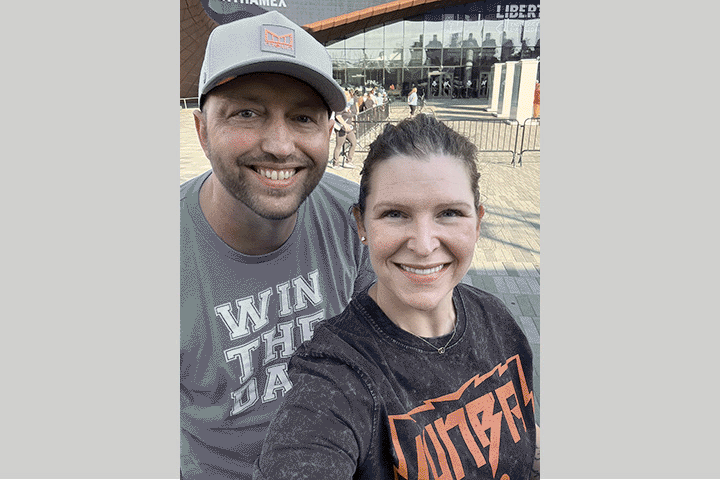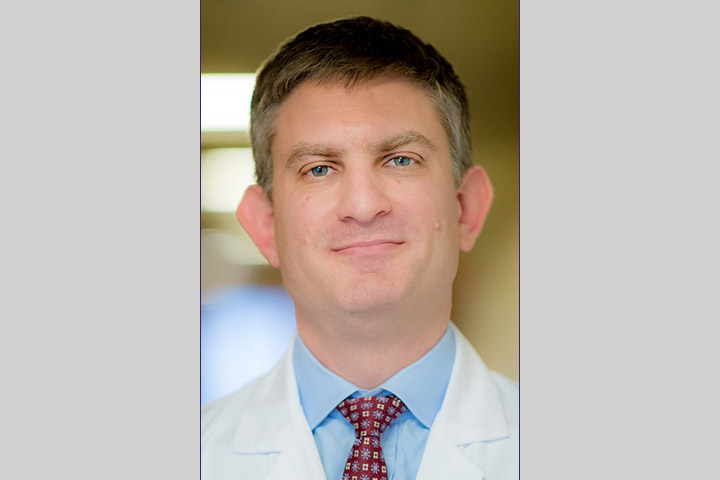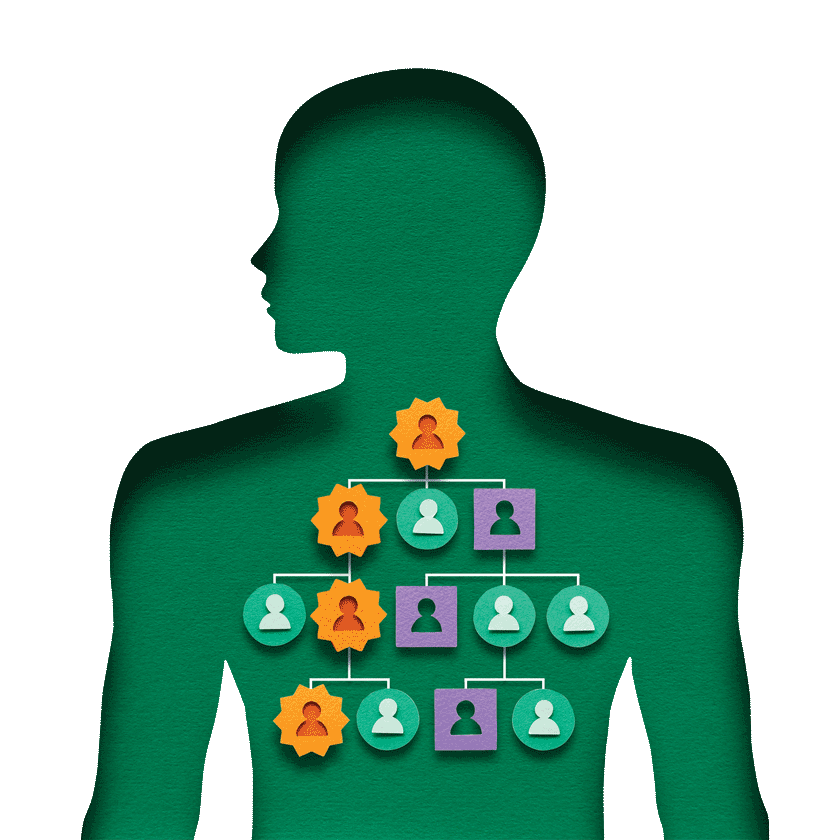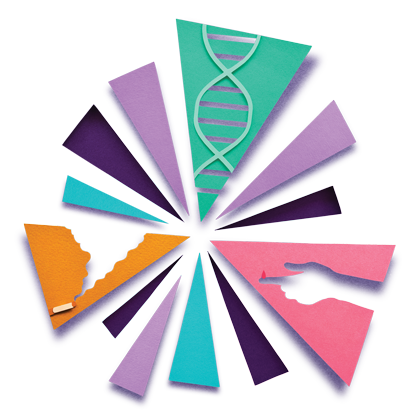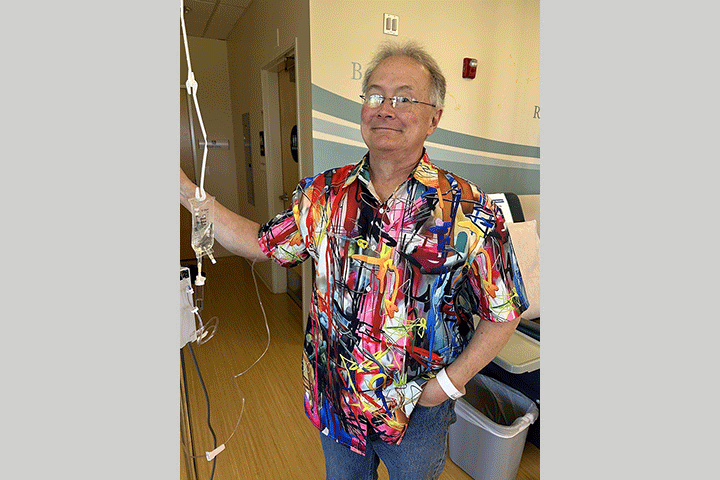A Family Tree Bent but Not Broken by Pancreatic Cancer
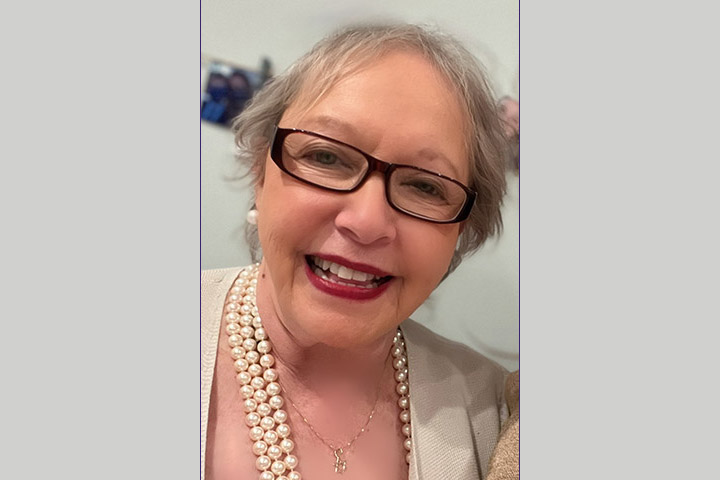
- Extensive family history of pancreatic cancer but no known mutation
- Regular screening misses a growing tumor until symptoms show up; stage III diagnosis
- Two different chemotherapies, followed by stereotactic body radiation therapy
- Regular follow-up scans
Pancreatic cancer has defined my family’s medical life since I was 13 years old.
My mother was diagnosed at the age of 44 and died one year later. Since that very sad day, I have lost both brothers (one passed away 11 days after diagnosis, the other three months), two aunts, and two first cousins to this vicious disease. If there was anyone who understood the importance of regular screening and early testing, it was I.
Despite being BRCA negative, I knew there were risks associated with being Jewish of Ashkenazi descent. I was regularly screened for pancreatic cancer locally at home in Virginia. My primary care physician flagged my chart with my family history to call extra attention to my scans. I insisted my adult children also educate themselves about their genetic history.
So you can imagine how shocked, betrayed, and defeated I felt when I got my own diagnosis when it had already progressed to stage III. I was so sure of my near-term outcome that I put my favorite CD of soothing music in my nightstand for my family to play for me in my final days when I would not be able to request it myself. (I’m a planner.) That was in 2015.
Eight years, six doctors, one trial, and three different protocols later, I’m still telling my story, bearing witness to the power of grit, the blessing of family, the dedication of doctors, and the brilliance of modern medicine.
The Odds Are Changing
I love the many extraordinary stories others have shared with Let’s Win about their triumph over pancreatic cancer. My story is similar in some ways, different in others—but when there are this many stories about people beating the odds, it is my hope that we can begin to change our collective mindset about what those odds really are.
Radiologist Missed My Tumor
After receiving what was thought to be a clean scan in January 2015, I still asked relatives to refer me to their preferred oncologist at Johns Hopkins so that I could get a more rigorous surveillance. I figured it was time to pay more attention. My appointment was scheduled for July.
In the intervening time, I started to have stomach problems and a backache that wouldn’t go away. I was sleeping on the floor because I couldn’t get comfortable in my own bed. Despite the scan I’d gotten five months earlier, my primary care physician, Dr. Charles Lisner at Sentara Health in Norfolk, Virginia, insisted on scanning me himself. This additional imaging—ordered because of my complaints of pain—shocked us all. Dr. Lisner saw what the radiologist had missed: a shadow on my scan. He ordered an endoscopic ultrasound (EUS) immediately and called me later that day to confirm what I did not want to hear: I had stage III pancreatic cancer, already spreading outside my pancreas. The tumor had wrapped around my superior mesenteric and celiac arteries. Surgery was no longer an option. Treatment might be able to shrink my tumor, but there was no chance of removing it now.
It’s GO Time!
It was ironic to phone Johns Hopkins prior to my first scheduled appointment to inform them that I had already been diagnosed with pancreatic cancer. They were fast to respond and I had a new appointment within three days. Nurse Hilary Cosby was my first contact at Johns Hopkins and has been my go-to ever since. She rallied behind me from Day One. Nurse Cosby connected me to Dr. Marcia Canto, Director of Clinical Research, Division of Gastroenterology, and Professor of Medicine, who ordered another EUS. I was immediately surrounded by a team of medical professionals, including oncologists, radiologists, nutritionists, physical therapists, and genetic counselors, who developed my treatment plan. It was initially overwhelming and dizzying but ultimately reassuring that so many people were there for me.
My oncology team at Johns Hopkins included Dr. Daniel Laheru, Dr. Joseph Herman (now at Northwell Health on Long Island, New York), and Dr. Katherine Bever. They wanted me to join a trial, but that required a piece of my pancreas for the research. Unfortunately, nothing had been preserved from my original biopsy. [PRO TIP: Make sure all your doctors, from the very beginning, know to preserve the biopsy from the pancreas so that it can be used for subsequent research!]
Getting Treated Locally
Once we ruled out surgery and the initial research study, the only two choices I had were immunotherapy at the University of Virginia three hours away, or traditional chemotherapy. I wanted to be treated locally because I felt more comfortable in my hometown. Dr. Laheru connected me with Dr. Thomas Alberico of Virginia Oncology Associates, a popular and respected oncologist in Norfolk. Dr. Laheru and Dr. Alberico collaborated on my treatment plan and worked well together over the course of my treatment.
In summer 2015 I began taking FOLFIRINOX. The first infusions were so powerful they landed me in the hospital. It felt like my eyes were spinning around in my head! Six months later FOLFIRINOX had so completely wiped out my platelets that I ended up in the hospital again. Doctors recommend patients on this drug be under 75 years old and in good condition. We didn’t think it was working anyway so I switched to gemcitabine and Abraxane. It was two weeks on followed by one week off, depending on my blood counts. I would also come home with a self-administered pump of chemo on the weekends. Finally, Dr. Herman gave me five days of stereotactic body radiation therapy in March 2017.
For a short time I was on investigational meds at Johns Hopkins. It was an exploratory study for a medicine called metformin, which is typically used to treat diabetes. My blood urea nitrogen (BUN) counts and creatinine counts went up and it seemed to be affecting my kidneys, so I stopped.
Life During Treatment
The side effects of chemo were hard on me. I lost all of my hair though some of it has grown back. I was nauseated a lot. I slept a lot, but I think that helped with my healing. I lost 35 pounds. I had a metallic taste in my mouth for the first year, but it eventually tapered off.
My husband Barry did everything for me while I was undergoing treatment. He brought my never-ending cocktail of pills to me, tried to get me to eat, and took me everywhere I wanted to go. He was supportive in every sense of the word—physically, emotionally, mentally. I couldn’t have made it through this without him.
My kids were also an important part of my therapy. Two of them live in California and the other lives in Charlottesville. They visited often and it helped immensely.
Dr. Alberico said at a certain point that if we continued with the chemo, I would likely end up with severe neuropathy. It was my decision whether to start tapering the chemo or keep going full bore. I wanted to press on. (“Better to be a little slower ambulating above ground than to be under ground,” I mused darkly.) So the chemo continued, but he was right. I still have numbness in my feet and the long course of chemo destroyed the nerves in my legs. With the help of my friends and family (and my handy cane), I am able to get around well enough—a trade-off I’d make again.
Difficult, But Worth It
You may be thinking that my journey was difficult and you are right. It was hard, but it was worth it. I stopped all therapies in July 2017 and I am still here! I continue to have a wonderful life and I am grateful for the difficult journey that I had. Even after the technician missed my tumor, after my eventual and grim diagnosis . . . after losing my mom and two brothers to this disease . . . and after a heck of a battle . . . I’m still here! I have always told everyone: don’t count me out! You just never know what life has in store.
I Still Have a Tumor
Now it is November 2023. People are shocked to know that there is still a tumor inside of me. I am a pancreatic cancer survivor and I have been living with my tumor for more than eight years. I also still have my ports (I’m too superstitious to have them removed.) This is the way I have chosen to move forward and it works for me. I have scans and blood tests regularly.
Dr. Alberico said that in all his years of practicing, and of all his patients, he has never seen anyone who continues to thrive despite living with a tumor and choosing not to have ongoing chemotherapy. There truly is no paradigm for me. Or for anyone else, for that matter.
My brother lost his short battle with pancreatic cancer in 2018 and three years later, my husband, to whom I had been married for 58 years, sadly passed away after a two-year battle with prostate cancer. Despite his diagnosis, I didn’t rule him out either. He and I did couples oncology together for a time at Johns Hopkins. It may not have been the couples cruise or the couples spa treatments that we dreamed of, but it was definitely a unique part of our story. I attribute our positive attitudes to keeping him alive as long as we did.
Attitude Is Everything
A third cousin was diagnosed with pancreatic cancer recently and is going through treatment at Duke. That makes nine of us within one family that have been officially diagnosed with pancreatic cancer. Given our extensive histories with this disease, we are the second largest family participating in research at Johns Hopkins. I am confident that all of this research will lead to better treatments and eventually to a cure.
To everyone else who gets the diagnosis of pancreatic cancer, I say: don’t be counted out so quickly. I’m still around, even after everything. I will officially turn 80 on New Year’s Eve of this year. How nice that everyone celebrates that day with me! And I’m looking forward to celebrating with the world for many years to come!
